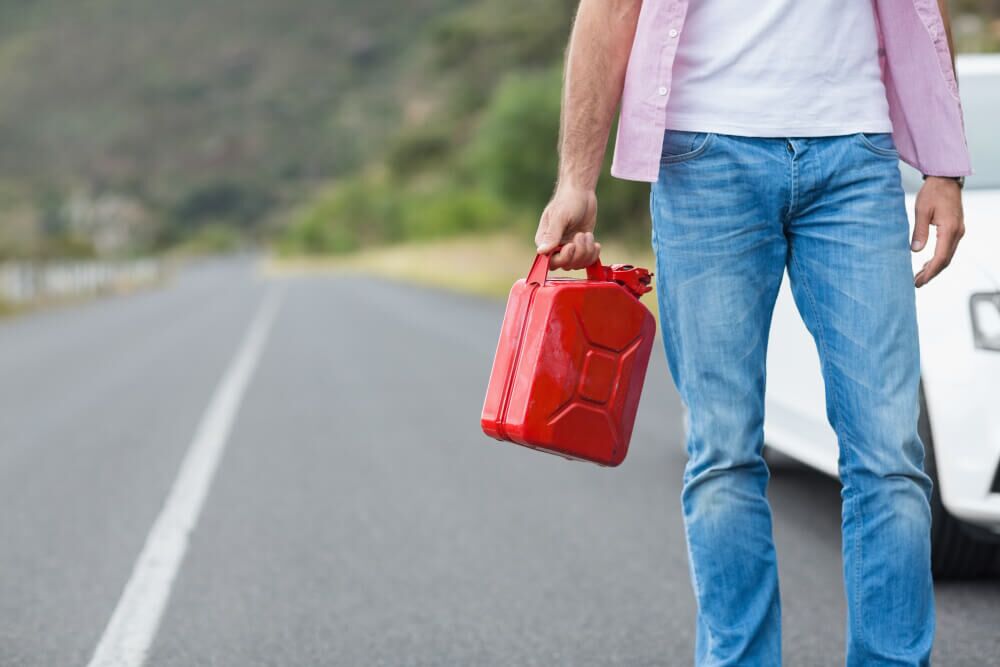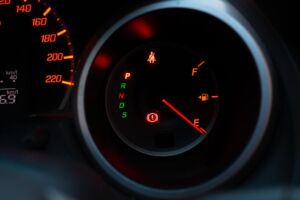Your car comes to a complete stop on South Boulevard, and the fuel gauge reads empty. Your phone has a battery, but you’re facing a decision that many Charlotte drivers encounter: should you walk to find a gas station or call for professional fuel delivery service?
This situation happens more often than you might think, especially with Charlotte’s sprawling layout and busy traffic patterns. The choice between walking to a gas station versus calling for fuel delivery involves more factors than just the obvious costs.
At Sunny Day Towing & Auto Transportation, we help Charlotte area drivers navigate these exact situations every day. You can reach us at (704) 504-7449 when you need reliable fuel delivery service throughout Charlotte, Gastonia, Pineville, and Matthews.
This guide breaks down the real costs, safety considerations, and practical factors that should influence your decision. You’ll learn about hidden expenses you probably haven’t considered, safety risks that could put you in danger, and when each option makes the most financial sense. We’ll also cover special situations where one choice clearly beats the other, helping you make informed decisions during stressful moments.
The Real Cost of Walking to Gas Stations
Walking to a gas station seems like the obvious money-saving choice, but the true expenses add up quickly when you consider all the factors involved.
Time Investment and Hidden Costs
Most Charlotte neighborhoods don’t have gas stations within easy walking distance. The average walk to reach a station ranges from half a mile to over two miles, depending on your location. A round trip can easily take 45 minutes to an hour and a half, especially when you factor in the time spent purchasing containers and waiting in line.
Time has value, particularly when you’re missing work, appointments, or family obligations. If you earn $20 per hour, that hour-long walk just cost you $20 in lost wages, not counting any additional delays caused by your absence.
Weather conditions in North Carolina can make walking uncomfortable or dangerous. Summer heat, winter cold, and sudden thunderstorms can turn a simple walk into a miserable experience that affects your health and clothing.
Equipment and Transportation Challenges
Gas stations sell portable fuel containers, but these typically cost $15 to $25 for basic models. Larger vehicles with bigger tanks might require multiple containers or several trips, multiplying both the cost and time investment.
Carrying gasoline creates safety concerns beyond just the physical effort. Spills can damage clothing, create fire hazards, and potentially result in environmental fines if fuel reaches storm drains or soil.
If the walking distance proves too far or conditions are unsafe, you’ll need alternative transportation to reach a gas station. Uber or taxi rides to gas stations and back can cost $15 to $30, eliminating any savings from avoiding fuel delivery services.
Vehicle Security and Legal Risks
Leaving your vehicle unattended creates opportunities for theft, vandalism, or break-ins. Even in relatively safe areas, unattended cars become targets, especially when they’re obviously disabled and the owner is nowhere to be seen.
Parking regulations don’t pause for emergencies. If your empty tank leaves you stopped in a restricted zone, no-parking area, or blocking traffic, you could face parking tickets or even towing fees that far exceed fuel delivery costs.
Professional Fuel Delivery Service Analysis
Professional fuel delivery involves upfront costs, but the total expense often compares favorably when you account for all factors involved in the gas station walk alternative.
Fuel Delivery vs Gas Station Cost Breakdown
Most Charlotte fuel delivery services charge between $30 to $60 for basic emergency fuel delivery, depending on your location and the amount of fuel needed. This fee typically includes both the service charge and enough gasoline to get you to the nearest station.
Fuel pricing through delivery services usually matches or comes close to retail gas station prices. While you might pay slightly more per gallon, the difference is often minimal compared to the convenience and safety benefits provided.
Professional services bring proper equipment, including commercial-grade fuel containers, spill prevention materials, and safety gear. You don’t need to purchase containers or worry about proper fuel handling procedures.
Time and Convenience Benefits
Response times for Charlotte area fuel delivery typically range from 20 to 45 minutes, depending on your location and current demand. During this waiting period, you can remain in your vehicle, make phone calls, or handle other business instead of walking and carrying fuel containers.
Professional drivers know Charlotte roads and can locate you efficiently, even in unfamiliar areas or complex parking situations. You don’t need to provide detailed directions to gas stations or worry about getting lost in neighborhoods you don’t know well.
Many fuel delivery services operate 24/7, providing assistance during late night hours when walking to gas stations becomes significantly more dangerous and many stations may be closed.
Safety Comparison: Fuel Delivery vs Gas Station Walk
Safety considerations often tip the balance toward professional fuel delivery, particularly in certain locations and conditions around Charlotte.
Walking along busy Charlotte roads like Independence Boulevard, Albemarle Road, or Highway 51 puts pedestrians at serious risk from distracted drivers and heavy traffic. Many Charlotte area roads lack adequate sidewalks or safe pedestrian crossings.
Personal safety concerns increase in unfamiliar neighborhoods, during evening hours, or in areas with higher crime rates. Professional fuel delivery eliminates these risks by bringing the service to you.
Fuel handling requires proper procedures to prevent spills, fires, or exposure to harmful vapors. Professional drivers receive training in safe fuel transfer methods and carry proper equipment to minimize environmental and safety risks.
Your vehicle remains secure when you stay with it during professional fuel delivery. Valuables, important documents, and personal belongings stay protected while you wait for service.
Special Situations: When Each Option Makes Sense
Certain circumstances clearly favor one choice over the other, helping you make quick decisions during stressful moments.
Best Scenarios for Walking to Gas Stations
Walking makes sense when you’re in a safe, familiar neighborhood with a gas station within a quarter-mile, during good weather and daylight hours, with no time constraints or safety concerns.
If you’re physically fit, enjoy walking, and view the situation as minor exercise rather than an emergency, the gas station walk can provide a positive experience while saving money.
Ideal Situations for Fuel Delivery
Highway breakdowns, busy road locations, unfamiliar areas, bad weather, nighttime emergencies, and time-sensitive situations all favor professional fuel delivery services.
Business travel, family emergencies, important appointments, or situations where your personal safety could be at risk make fuel delivery the clear choice regardless of cost differences.
Areas like Gastonia, Pineville, and Matthews often have longer distances between gas stations, making professional delivery more practical than extended walks through suburban areas.
Making the Right Choice for Your Situation
Your decision should consider immediate safety, total costs including hidden expenses, time constraints, and personal circumstances surrounding the emergency.
Evaluate your location honestly. Highway shoulders, busy commercial areas, and unfamiliar neighborhoods present safety risks that outweigh potential savings from walking to gas stations.
Consider weather conditions, time of day, your physical condition, and whether you have important commitments that could be affected by extended delays.
Plan ahead by researching fuel delivery services in your area and saving contact information in your phone before you need emergency assistance.
Conclusion
The fuel delivery vs gas station decision involves more than just comparing service fees to gas container costs. When you factor in time value, safety risks, hidden expenses, and convenience benefits, professional fuel delivery often provides better overall value for Charlotte area drivers.
Safety should be your top priority during any roadside emergency. Professional services eliminate personal risks while providing reliable solutions that get you back on the road quickly and safely.
At Sunny Day Towing & Auto Transportation, we provide professional fuel delivery throughout Charlotte, Gastonia, Pineville, and Matthews with trained drivers, proper equipment, and competitive pricing. Save our number now for future emergencies: (704) 504-7449. When you’re stranded without fuel, we’ll help you make the right choice by providing fast, safe, and reliable service when you need it most.



